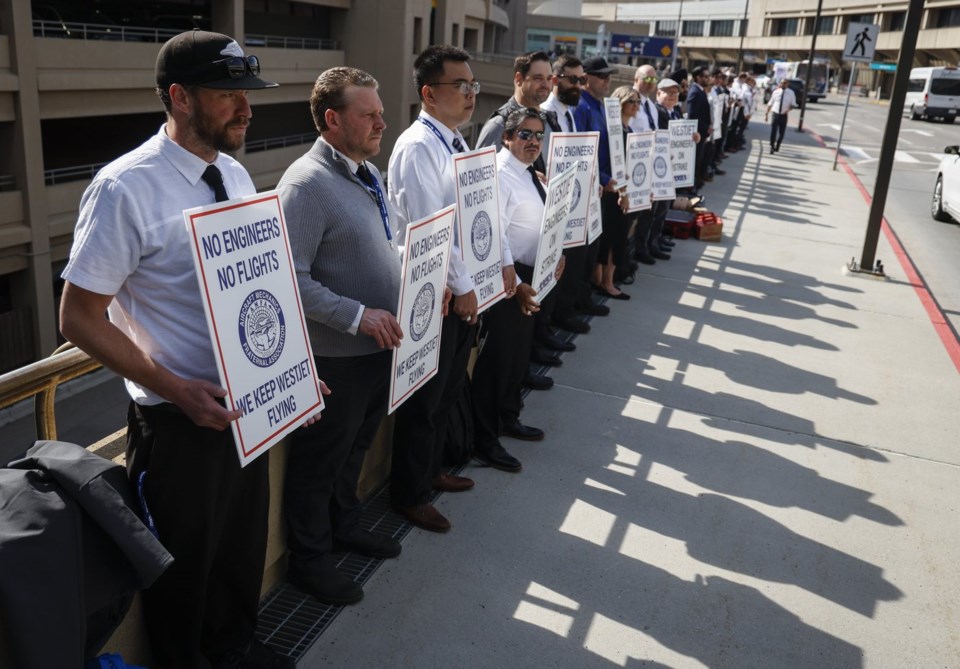Arbitration doesn't typically spur a strike. If anything, the reverse occurs.
But on Thursday, a directive for binding arbitration from Labour Minister Seamus O'Regan was met with job action by WestJet plane mechanics just one day after it was issued, catching the airline and the government off guard and marking a turbulent start to one of the busiest travel weekends of the summer.
The work stoppage, which ended late Sunday night, raises questions about a dispute resolution process that pushed tensions to the breaking point and how consumers should respond to the threat of an airline strike.
Given the minister's broad authority "to secure industrial peace" under the Canada Labour Code, O'Regan had the power to bar a strike in a directive to the country's labour tribunal that imposes binding arbitration, said a union official and aviation experts.
In their public statements last week, both the airline and the federal government seemed to presume a strike was off the table after the order, but a ruling Friday by the Canada Industrial Relations Board said the union's 680 WestJet workers could still walk off the job because the directive had not explicitly suspended that right.
The decision forced WestJet to call off more than 1,100 flights affecting roughly 150,000 travellers — many of whom received less than a day's notice — according to figures from the Calgary-based company and tracking service FlightAware.
The strike sparked outrage in the C-Suite.
"In my 25 years in aviation, I have never encountered such an unreasonable counterparty. Calling for a strike despite the minister ordering arbitration is a misuse of the right to strike," said CEO Alexis von Hoensbroech in a post on LinkedIn.
He said in the statement that the move served no purpose other than disrupting customers and "creating damage" to the carrier.
"Once the parties are in arbitration, there is no more bargaining taking place, so a strike no longer influences the outcome."
That turned out not to be the case. Talks did resume over the weekend, and they yielded a tentative deal that would see the mechanics receive a 30-per-cent boost in total compensation over the contract's five-year term, according to Ian Evershed, a representative for the Airplane Mechanics Fraternal Association who helped lead the negotiations.
Now, arbitration will only kick in if workers vote to turn down the agreement. They overwhelmingly rejected an initial offer in a mid-June vote, prompting WestJet to request binding arbitration and setting in motion the manoeuvres that culminated in the Canada Day long weekend strike.
The work stoppage took a toll on consumer goodwill, with travellers venting their frustration on social media in sometimes colourful language.
One customer said on the X platform the airline informed them only at 11:12 p.m. on Saturday that their next-day flight out of Las Vegas was cancelled, calling the last-minute move "scumbag behaviour."
While most travellers could receive refunds from WestJet, those with related costs tied to hotel or other flight bookings — that they missed, or that they made while stuck abroad — might not get that money back without coverage for trip cancellation or interruption, said Marty Firestone, president of insurance firm Travel Secure Inc.
"This has been a nightmare for people," he said. "Getting that refund for your airfare is the least of your problems."
The strike also left both sides in the standoff embittered.
In the conference room at a hotel near Toronto's Pearson airport, the mood see-sawed wildly from day to day, Evershed said.
"When the ministerial referral came through we felt completely defeated. And then likewise over the course of the next day or two where the CIRB upheld our right to strike ... we were elated," he said.
"I'm sure that the company was just devastated by that."
As the weekend wore on, the friction only intensified.
“Emotions are running high. The big contributing factor is fatigue ... There are points where frustration takes over," Evershed said.
“Some of the things that have been said publicly — it’s unfortunate that it went that far," he added, referring to both parties. In an update Sunday morning, the union negotiating committee said it was "the victim of WestJet’s virulent PR campaign that (members) are scofflaws," citing "calumnies" against workers around their right to strike.
Eventually, a hard-headed resolve to hash out a deal took hold. Von Hoensbroech joined the talks Sunday morning, a WestJet spokesperson confirmed. The CEO and Evershed spoke via video conference late Sunday afternoon, and the two sides reached an agreement at 10:30 p.m. MDT, said the union rep — a mechanic at the carrier for more than 15 years.
“At the end of this, I’m a WestJet employee."
This report by The Canadian Press was first published July 2, 2024.
Christopher Reynolds, The Canadian Press




